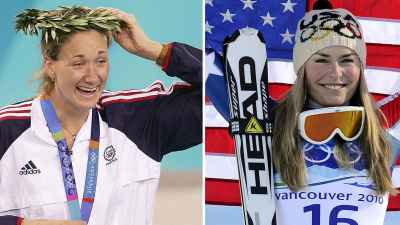Gabby Douglas looks on prior to the 2024 Core Hydration Classic at XL Center on May 18, 2024 in Hartford, Connecticut. Tim Nwachukwu/Getty Images
Gabby Douglas’ bid for a spot in the 2024 Paris Olympics came to an end in May when she injured her ankle, but the gymnast is not giving up on her comeback dreams.
“I do have [the Summer 2028 Olympics] in the back of my mind,” Douglas, 28, exclusively told Us Weekly on Wednesday, July 17, while promoting her partnership with Ancestry. “And even before that, there are a lot of world championships that I want to go to [and] more competitions internationally.”
Douglas hurt her ankle during a training session ahead of the U.S. Gymnastics Championships.
“Obviously, it was very bittersweet, but I’m excited to see what the future holds,” Douglas said of her injury. She added that it was “very difficult” to come to terms with the fact that the 2024 Olympics were not in the cards for her.
“You want to keep pushing through, but then at the same time my body was like, ‘Oh, maybe we need to stop,’” Douglas recalled. “It was kind of that, ‘Oh, should we push it? … Push it to the brink and make it a little worse? … Or do I take a break and rest and then kind of move on from that?’ It was a very hard decision.”
Douglas’ advice to other athletes who’ve faced roadblocks in their careers is to “keep going,” but take breaks when needed.

Gabrielle Douglas Streeter Lecka/Getty Images
“If your body needs rest, that’s perfectly OK,” she said. “Take that rest, and come back even stronger and better. Life throws you a lot of different challenges and curve balls, but don’t be discouraged. Just find a different route.”
Douglas was a member of the gold medal-winning U.S. gymnastics teams at both the 2012 and the 2016 Summer Olympics. She is the 2012 Olympic all-around champion and the 2015 all-around silver medalist. Douglas told Us that she’s seen some positive changes to the sport over the years.
“I think it’s a lot more open to the gymnast and their bodies, and I kind of love it because it is a very hard sport,” she said. “It’s very grueling on your body, so the more you can communicate to the coach [the better].”
Douglas also mentioned the challenging nature of the sport when asked about her former teammate Simone Biles’ chances going into the Paris Olympics. (Biles, 27, withdrew from most of the competitions during the 2020 Summer Olympics, citing mental health issues.)
“Gymnastics is very mental, and so once you calm your mind and [don’t] really stress yourself out, it’s all good,” Douglas said.
As someone who has competed with champions and been a champion herself, Douglas knows firsthand how much hard work goes into qualifying for the Olympics. Through her partnership with Ancestry, she got to learn more about what makes a great athlete.
“I’ve partnered with Ancestry to find out if it’s training or DNA, and it’s a little bit of both,” she said. “Four generations [back on] my mom’s side — like, [my] great-great-great grandfather — he was a porter for a gymnastics club. And it was, like, 100 years later, I won the Olympics. … So crazy. Being able to see natural flexibility, strength and all the traits that I have, it makes sense why these things come natural [to me].”
Anyone can compare their genetic traits for athleticism to world-class athletes at Ancestry.com/BringYourDNAGame.
With reporting by Christina Garibaldi



